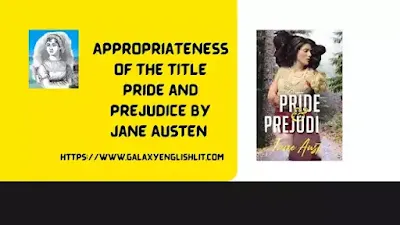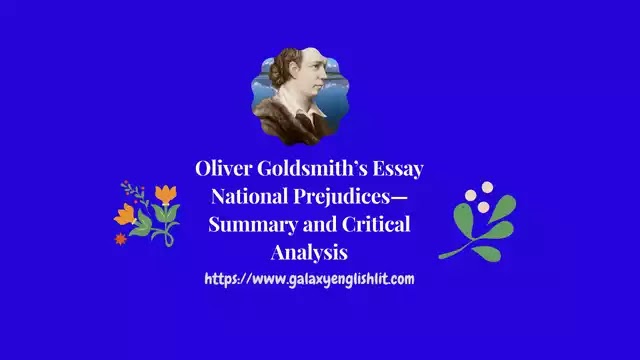The Source of the Title:
The whole of this unfortunate business has been the result of Pride and Prejudice: these words from Fanny Burney's ‘Cecilia’ might have easily been as has been claimed the source of title. Jane Austen has first named the novel ‘First Impressions’— which was also a suggestive title, the implication being that first impressions are not usually lasting: but that they die hard : but that they die hard : even if they are wrong , they last long . It was not at all an inappropriate title, but it is no way a ‘better title’ as Cornish says.
 |
| Appropriateness of the Title Pride and Prejudice by Jane Austen |
The New Title Representing Two Characters:
The new title Pride and Prejudice represents two characters—Darcy represents family pride; Elizabeth is possessed by the prejudice that he is all pride, and this prejudice is also held by a number of other characters. The story is a story of the misunderstandings, involvements, catastrophes arising out of these two human feelings—and of the sweet results of their softening or removal.
Darcy's Pride:
It is because of his family pride that Darcy interferes with Jane and Bingley's love affair. His pride keeps him aloof, apart from society, full of self-love. Nothing can excuse his remark about Elizabeth. “…..tolerable but not handsome enough to tempt me nor, indeed, the statement that my good opinion once lost is lost forever.” His first appearance is appallingly insolent and we tend to agree with Mrs. Bennet's complaint . “He walked here and he walked there, fancying himself so very great” and share with her the desire to see Mr. Darcy get a set down.
Elizabeth's Prejudice:
Darcy's pride piques Elizabeth and her prejudice stems from her feeling that he is all pride. Having been prejudiced against him by his refusal to dance with her, she wilfully misinterprets all his utterances, all his actions. Her prejudice clouds her usually clear judgment and she listens to Wickham's biased and slanderous account of Darcy with complete belief declaring Darcy to be abominable. Blinded by prejudice she rejects his proposal.
Excessive Love of Darcy Curing his Pride:
His lesson is complete when he is totally humbled by Elizabeth's rejection of his proposal. Confident of being accepted her rejection makes him realize his misplaced pride in the acquirements which cannot please the woman he loves. This excessive love for Elizabeth is what cures Darcy of his pride and humbling himself he writes an explanatory letter to Elizabeth.
Neutralizing of Elizabeth's Prejudice:
Elizabeth's Prejudice is neutralized by the revelation of Darcy's character. Her moment of self - awakening comes on receipt of Darcy's letter. Learning the truth about Wickham, she realizes her own blindness and prejudice in having judged Darcy and Wickham on mere first impressions. She is able too, to see the validity of some of his objections to the Jane - Bingley marriage. From the housekeeper's testimony, at Pemberley, she learns that Darcy's austerity of manner, stems partly from an inordinate shyness and she is further softened towards Darcy. The Lydia - Wickham episode brings the final reconciliation , with Darcy having overcome his pride completely to involve himself in the Bennets ' disgrace and have for his brother - in - law the man he most despises . This overwhelms Elizabeth and cures her of her initial prejudice against him . She recognizes that Darcy was exactly the man who , in disposition and talents , would most suit her .
The Importance of Jane and Bingley in the Theme of the Novel:
It is true that Jane Bennet and Bingley are not part of the theme of Pride and Prejudice but their love is an important link in the novel and without it the story cannot be complete. Jane is a specimen of faultness beauty and she is free from all the vices of Elizabeth's temperament - she is neither proud nor prejudiced and is ever willing to see good in everyone. Similarly Bingley is easy going and friendly and has none of the haughtiness, pride or cold reserve of Darcy. But both Jane and Bingley are simple characters.
Pride and Prejudice in Minor Characters:
Lady Catherine de Bourgh is a hilarious caricature of the same faults of pride and prejudice. She has all the pride of family and position. Mr. Collins is a mixture of obsequiousness and pride. He is a sycophant, and flatterer of Lady Catherine. Mrs. Bennet has a pride in her daughters and in her stupidity develops a prejudice against Darcy. Thus the title Pride and Prejudice is very apt and points to the theme of her novel.





